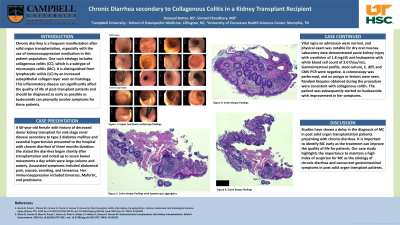Sunday Poster Session
Category: IBD
P0996 - Chronic Diarrhea Secondary to Collagenous Colitis in a Kidney Transplant Recipient
Sunday, October 27, 2024
3:30 PM - 7:00 PM ET
Location: Exhibit Hall E

Has Audio

Sirmad B. Chaudhary, MD
University of Tennessee Health Science Center, Methodist University Hospital
Louisville, KY
Presenting Author(s)
Danyaal Buttar, BS1, Sirmad B. Chaudhary, MD2
1Campbell University School of Osteopathic Medicine, Lillington, NC; 2University of Tennessee Health Science Center, Methodist University Hospital, Memphis, TN
Introduction: Chronic diarrhea is a frequent manifestation after solid organ transplantation, especially with the usage of immunosuppressant therapy in this patient population. One such etiology includes collagenous colitis (CC), which is a subtype of microscopic colitis (MC). It is distinguished from lymphocytic colitis (LC) by an increased subepithelial collagen layer seen on histology. This inflammatory disease can significantly affect the quality of life of post-transplant patients and should be diagnosed as early as possible. Budesonide can promptly resolve symptoms for these patients.
Case Description/Methods: A 60-year-old female with history of deceased donor kidney transplant for end-stage renal disease secondary to type 2 diabetes mellitus and essential hypertension presented to the hospital with chronic diarrhea of 3 months duration. She stated the diarrhea began shortly after transplantation and noted up to 7 bowel movements a day which were large-volume and watery. Associated symptoms included abdominal pain, nausea, vomiting, and tenesmus. Her immunosuppression included Envarsus, Myfortic, and prednisone. Vital signs on admission were normal, and physical exam was notable for dry oral mucosa. Laboratory data demonstrated acute kidney injury with creatinine of 1.8 mg/dL and leukopenia with white blood cell count of 2.0 thou/mcL. Gastrointestinal profile, stool culture, C. diff, and CMV PCR were negative. A colonoscopy was performed, and no polyps or lesions were seen. Random biopsies obtained during the procedure were consistent with collagenous colitis. The patient was subsequently started on budesonide with improvement in her symptoms.
Discussion: Studies have shown a delay in the diagnosis of MC in post solid organ transplantation patients presenting with chronic diarrhea. It is important to identify MC early as the treatment can improve the quality of life for patients. Our case study highlights the importance to keep a low threshold for MC as the cause of diarrhea and concurrent gastrointestinal symptoms in this patient population.
Disclosures:
Danyaal Buttar, BS1, Sirmad B. Chaudhary, MD2. P0996 - Chronic Diarrhea Secondary to Collagenous Colitis in a Kidney Transplant Recipient, ACG 2024 Annual Scientific Meeting Abstracts. Philadelphia, PA: American College of Gastroenterology.
1Campbell University School of Osteopathic Medicine, Lillington, NC; 2University of Tennessee Health Science Center, Methodist University Hospital, Memphis, TN
Introduction: Chronic diarrhea is a frequent manifestation after solid organ transplantation, especially with the usage of immunosuppressant therapy in this patient population. One such etiology includes collagenous colitis (CC), which is a subtype of microscopic colitis (MC). It is distinguished from lymphocytic colitis (LC) by an increased subepithelial collagen layer seen on histology. This inflammatory disease can significantly affect the quality of life of post-transplant patients and should be diagnosed as early as possible. Budesonide can promptly resolve symptoms for these patients.
Case Description/Methods: A 60-year-old female with history of deceased donor kidney transplant for end-stage renal disease secondary to type 2 diabetes mellitus and essential hypertension presented to the hospital with chronic diarrhea of 3 months duration. She stated the diarrhea began shortly after transplantation and noted up to 7 bowel movements a day which were large-volume and watery. Associated symptoms included abdominal pain, nausea, vomiting, and tenesmus. Her immunosuppression included Envarsus, Myfortic, and prednisone. Vital signs on admission were normal, and physical exam was notable for dry oral mucosa. Laboratory data demonstrated acute kidney injury with creatinine of 1.8 mg/dL and leukopenia with white blood cell count of 2.0 thou/mcL. Gastrointestinal profile, stool culture, C. diff, and CMV PCR were negative. A colonoscopy was performed, and no polyps or lesions were seen. Random biopsies obtained during the procedure were consistent with collagenous colitis. The patient was subsequently started on budesonide with improvement in her symptoms.
Discussion: Studies have shown a delay in the diagnosis of MC in post solid organ transplantation patients presenting with chronic diarrhea. It is important to identify MC early as the treatment can improve the quality of life for patients. Our case study highlights the importance to keep a low threshold for MC as the cause of diarrhea and concurrent gastrointestinal symptoms in this patient population.
Disclosures:
Danyaal Buttar indicated no relevant financial relationships.
Sirmad Chaudhary indicated no relevant financial relationships.
Danyaal Buttar, BS1, Sirmad B. Chaudhary, MD2. P0996 - Chronic Diarrhea Secondary to Collagenous Colitis in a Kidney Transplant Recipient, ACG 2024 Annual Scientific Meeting Abstracts. Philadelphia, PA: American College of Gastroenterology.
